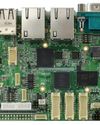A Differential Scanning Calorimeter Using a Cellphone and GUI-O User Interface
Circuit Cellar
|July 2025
In this month’s article, Brian describes how he built his latest version of a Differential Scanning Calorimeter—the first version of which he designed 20 years ago.

In this article I'll be describing the most recent version of a Differential Scanning Calorimeter (DSC) that I originally designed for use in university Material Science teaching labs. I have built many of these units over the last 20 years, though this latest version differs from past units in that it uses a cellphone as the user interface. All previous versions were connected to, and controlled by, a PC.
The following summary, which describes a basic DSC instrument, is part of a conference presentation titled “Teaching Materials Science in the Lab: Learning Stuff from the Ground Up,” which I co-authored with Gianna Alemán-Milán, PhD, and Mary Anne White, PhD, and can be found on the Circuit Cellar Article Materials and Resources webpage [1].
A DSC measures the power necessary to establish a nearly zero temperature difference between a substance and a reference material as the two specimens are subjected to a temperature scan over a region of interest. This involves heating (and, optionally, may involve cooling), at a user-selected temperature scan rate. Throughout the scan, the temperatures of the sample and reference are kept the same by varying the power supplied to each of the sample and reference heaters. The energy required to do this is a measure of the enthalpy, or heat capacity changes, in the sample relative to the reference.
Denne historien er fra July 2025-utgaven av Circuit Cellar.
Abonner på Magzter GOLD for å få tilgang til tusenvis av kuraterte premiumhistorier og over 9000 magasiner og aviser.
Allerede abonnent? Logg på
FLERE HISTORIER FRA Circuit Cellar

Circuit Cellar
The Future of Sensors in Safety Systems Sensing the Stop
How Magnetic Sensors Are Enabling the Next Generation of Braking Systems
5 mins
December 2025
Circuit Cellar
Alif Semiconductor Elevates Generative AI at the Edge with New Support for ExecuTorch Runtime in Its Ensemble MCUs
Alif Semiconductor, the leading global supplier of secure, connected, power efficient Artificial Intelligence and Machine Learning (AI/ML) microcontrollers (MCUs) and fusion processors, announced that developers can now use the ExecuTorch Runtime, a quantization extension of the popular PyTorch ML framework, for AI applications built to run on its Ensemble E4/E6/E8 series of MCUs and fusion processors.
1 min
December 2025

Circuit Cellar
Encrypted MQTT Protocol for Critical Sectors
Mechanisms, Challenges, and Best Practices
3 mins
December 2025

Circuit Cellar
Datasheet: Small Size, Big Power
Smaller Microcontrollers Bring New Possibilities
9 mins
December 2025

Circuit Cellar
Analog Devices Launches ADI Power Studio and New Web-Based Tools
Analog Devices, Inc. (ADI), a global semiconductor leader, announced the launch of ADI Power Studio, a comprehensive family of products that offers advanced modeling, component recommendations, and efficiency analysis with simulation.
1 mins
December 2025

Circuit Cellar
Compact IBR300 2.5" SBC Powered by NXP i.MX 93 from IBASE
IBASE Technology, Inc., a leading provider of rugged embedded computing platforms, announced the release of the IBR300, a 2.5\" RISC-based single board computer (SBC) powered by the NXP i.MX 93 processor with dualcore ARM Cortex-A55 (up to 1.7GHz) and a Cortex-M33 MCU.
1 min
December 2025

Circuit Cellar
Sensors in the Spotlight
The Next Decade of Embedded Sensor Systems
12 mins
December 2025

Circuit Cellar
Bob's Wrap Up
In Bob's last article with Circuit Cellar, he attempts to wrap up a career of more than 50 years as an embedded systems engineer and 14 years with Circuit Cellar. He looks at each of his 58 articles by category and provides some recommendations for his fellow engineers.
7 mins
December 2025

Circuit Cellar
Designing Embedded Software Architectures That Last
I've reviewed hundreds of firmware projects over the years, and one thing always stands out: the most successful projects have a clear, deliberate architecture.
10 mins
December 2025
Circuit Cellar
Broadcom Introduces Industry's First Wi-Fi 8 Silicon Ecosystem Powering the AI Era
Broadcom, Inc. unveiled the first Wi-Fi 8 silicon solutions for broadband wireless, targeting residential gateways, enterprise access points, and smart mobile clients.
1 mins
December 2025
Listen
Translate
Change font size

